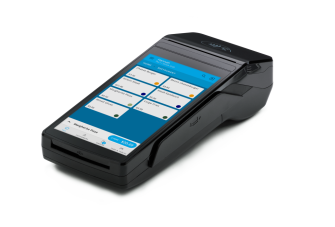Which type of credit card processing fees are cheapest for small businesses?
Credit card processing fees are an essential part of payment processing. Every credit or debit card transaction (even with services like Apple Pay or Google Pay that use a "virtual" card), incurs a card processing fee as the payment processor completes the sale. Without these credit card processing fees, it would be unprofitable for payment processors to process transactions.
Small businesses have traditionally favoured cash payments to avoid paying credit card processing fees. But over the years, consumers have moved towards credit and debit cards. With 20% of Canadians carrying no cash in their wallets, businesses can no longer afford to run on cash-only models. Small business owners must take credit cards to stay competitive.
It's perfectly understandable to have mixed emotions about accepting credit card payments. If you’ve found yourself struggling to accept card payments while still remaining profitable, or not sure what the terminology means, this blog and the team at Epos Now is here to help.
In this blog, we'll explain different credit card processing fees, what they mean for your business, and how you can accept credit cards without being buried by credit card transaction fees. Let’s get right into it!
What are the different credit card processing fees?
Due to the complicated nature of credit card processing fees, payment processors charge several different rates. Businesses are usually charged for every credit card transaction that goes through their point of sale (POS) except in very specific cases.
Credit card transaction fees pay for a variety of services that the payment processor provides. These services include facilitating the transaction, paying dues to the issuing banks, and hedging money in case of misuse or credit card fraud. These fees can also change depending on the card used (we'll explain this a little later on.)
Credit card networks use a number of different pricing models when they are processing fees. These pricing models are as follows:
- Flat rate
- Interchange fees
Over the next few paragraphs, we'll explain each of these credit card processing fees and what they mean for businesses like yours.
Flat rate
The clue for a flat rate, sometimes called a flat fee, is in the name. Flat rates describe credit card fees that charge one rate for all credit card transactions no matter what type of card is used. Debit transactions are $0.10, no matter the amount.
For example, whether a customer spends $1 or $100, and uses Visa or Mastercard, you will pay 2.5% on the transaction.
Thanks to flat fee transactions, businesses will have a good idea of how much money they'll keep after each sale. Understandably, this makes flat rates particularly attractive to businesses, though only a few processors offer them - we’re proud to say that Epos Now Payments is one such processor!
In the ever-changing worlds of retail and hospitality, flat credit card processing fees can be a welcome constant. They make sales forecasts a little easier as you'll always know what you're taking home.
However - be warned - sometimes companies have additional hidden fees when offering fixed flat rates. (But don’t worry - Epos Now Payments has no hidden extra costs!)
Interchange rates
Interchange fees are slightly more complicated than flat rates. For instance, some processors charge an "Interchange Plus" rate. Two factors that come into Canadian interchange fees are:
- Interchange fees - Interchange fees describe the charge that comes directly from the card networks. This card processing fee is set directly by the card provider or bank and can't be changed by the card processors. The merchant must absorb the cost of the interchange fee to process the transaction.
- Plus - This is the fee that the processor charges on top of the interchange fee. This is usually made up of a flat percentage fee and an additional transaction fee.
Interchange Plus fees vary depending on the type of card the customer uses. For example, some cards, such as American Express, will come with higher interchange fees.
There are some good benefits for businesses that choose interchange fees. For example, interchange fees give a clear breakdown of fees, as they are regulated by card networks and banks. Similarly, for smaller transactions, interchange rates can be cost-effective for small businesses that see only a few card types being used to pay for sales.
On the negative side, interchange fees can be complex (depending on the card type, industry and transaction size), and are normally non-negotiable - you likely won’t have bargaining power to negotiate lower rates with payment processors. If your customers use a wide range of card types, or a card type that charges a higher interchange fee (like American Express), you may get hit hard with your interchange fees.
It’s important that you carefully consider your business’ transaction volume, average transaction size, and industry-specific needs when evaluating the suitability of interchange rates for your payment processing.
Different credit card fees for different providers
The largest credit card companies in Canada include American Express, Mastercard, and Visa. In return for allowing cardholders, banks, and businesses to use the card network, these companies charge credit card processing fees. Cardholders pay annual fees and interest, and businesses pay processing fees.
Here are the credit card processing fees charged by each credit card network:
- American Express: 2.5% to 3.5%
- Mastercard: 1.55% to 2.6%
- Visa: 1.43% to 2.4%
As you can see, American Express (also known as Amex) charges more than the other major companies. For this reason, small businesses that want the cheapest credit card processing rates typically do not accept Amex cards. A card network that is subject to higher credit card processing fees offer robust rewards programs to entice new customers.
While you can certainly follow this model, it is not always the best choice. Unless your customer has another form of payment, declining to accept a credit card brand like Amex could cut off a revenue stream and could lead to customer disputes.
Choosing a credit card processing company
Your small business can’t accept debit and credit card payments without partnering with a credit card processor. These companies provide you with the hardware to accept card and contactless payments and facilitate the transaction.
While many processing companies will seem similar, they offer varying services. If you are wondering which credit card processing is cheapest for small businesses, it all comes down to the following two factors.
-
Forms of credit card processing
On top of the pricing structure, credit card processing companies charge various rates depending on how customers pay. If you want the cheapest processing fees, you may want to avoid providing these payment options.
In most cases, your customers will use card-present payments, meaning they will swipe, tap, or insert a credit or debit card. The card terminal verifies the physical presence of the guard, reducing the risk of fraud. In these cases, payment processors will charge you based on the structures mentioned above.
In some cases, customers that use card payments may have to sign a credit card authorization form. This form often consists of a single signature on the bottom of their receipt.
If you sell online or accept phone orders, you will need to accept card-not-present (CNP) payments. In these cases, a customer enters their card details into an online form or calls the business and reads their card details to you.
Since phone and online purchases are vulnerable to a higher level of fraud, payment processing companies charge more to execute these transactions. For this reason, you may want to avoid accepting CNP payments if you want cheaper card processing fees.
-
Hardware fees
Here is where many companies differ in service and price. Some payment processors offer free card terminals, while others charge one-time or recurring fees. On average, you can expect to pay anywhere from $200 to $1,000 for your payment processing hardware.
However, these prices do not always reflect the reality of the total cost as some providers will charge monthly fees for the use of their hardware. Some processors will even charge payment gateway fees to use their service.
Many companies will offer these devices but then require the business to sign a long-term contract requiring them to use the processor for many years. If you want to terminate this relationship, you will likely need to pay expensive cancellation fees. In these scenarios, you might spend more by choosing a free card terminal than by paying for one.
In a fully integrated point of sale (POS) system, such as the one offered by Epos Now, you can build a solution that covers all of your needs. Epos Now hardware is built with the needs of our customers in mind. This means that your card machines and countertop system will be able to accept credit cards from all credit card networks.
Additionally, your Epos Now system is also able to accept online payments via your website, debit card transactions, contactless payments, and mobile services such as Google Pay and Apple Pay. You can use another payments processor with your Epos Now card machines, or opt-in for Epos Now Payments for a seamless synced-up system (with one fixed rate and no hidden fees).
Helping you find the best option for credit card payments
As you can see, it isn’t easy to answer which credit card processing is cheapest for small businesses. Each business has to weigh its options and determine which processor offers the most cost-effective solution for their situation.
However, as we mentioned above, businesses can't afford to turn down credit card transactions as credit card usage continues to grow. This means that it's more important than ever to ensure that your POS system can accept payments from credit, debit, and other payment methods.
In addition to logging sales, managing inventory, building detailed business reports, and offering an award-winning suite of first and third-party apps, Epos Now is committed to providing businesses with access to the best payment gateways.
As part of our offering as a merchant services provider, Epos Now integrates with several payment processors throughout the world. Whether you’re selling in the United States, Australia, Europe, or elsewhere, we have payment processing partners who will support your POS.
Our systems are available to businesses across the retail and hospitality industries, no matter the size of their merchant account. If you're interested in finding out more about Epos Now, get in touch with our team of experts below.




